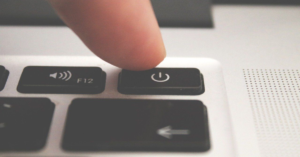The term “laptop” is one of the most recognizable words in the realm of technology today. It conjures images of portable, versatile computers that we carry from one place to another. But what exactly is a laptop’s meaning?
Contrary to what some might think, “laptop” isn’t an acronym or abbreviation. It is a compound word created from two simple parts: “lap” and “top.” This name was chosen to signify a computer that can comfortably sit on your lap while in use. This portability was the key differentiator when laptops first emerged, separating them from bulky desktop computers that remained fixed in one spot.
What is a Laptop?
A laptop is a small, portable personal computer that integrates all the components of a desktop computer into a single, compact unit. Unlike traditional desktop PCs, which have separate monitors, keyboards, and central processing units (CPUs), laptops combine these parts into one device.
The most defining feature of laptops is their portability. With a built-in screen, keyboard, mouse pad, and rechargeable battery, they allow users to work, play, and communicate from almost anywhere.
Importance of Laptops in Modern Life
Laptops have evolved from being luxuries to a necessity in everyday life. Some of the examples of their importance in different walks of life are:

- Education: Laptops have revolutionized education. Students can write assignments, browse the internet, and even study online. As e-learning sites become increasingly popular, laptops act as the interface between students and knowledge.
- Business: From creating presentations to handling financial accounts, laptops are a business necessity. Portability enables professionals to work from almost anywhere, and remote work becomes possible and productive.
- Entertainment: From watching films, gaming, or streaming your favorite shows, laptops provide limitless entertainment. They also serve creators in photography, video editing, and music production.
- Daily Convenience: Laptops do it all from online shopping, bill payments, and chatting with loved ones via video calls to keeping your personal calendar in order.
The Origin of the Word ‘Laptop’
The word “laptop” originated in the early 1980s. The first commercially available portable computers were heavy and often had to be placed on desks. These early models, such as the Osborne 1, were more “transportable” than truly portable. However, as technology advanced, more practical and lightweight designs emerged.
The term “laptop” was first coined as these new designs allowed users to place the computer on their laps, making computing more mobile and convenient. One of the first computers to be called a “laptop” was the Gavilan SC, released in 1983, which weighed around 9 pounds and could indeed be used while resting on one’s lap. The term stuck as laptops became more compact and common.
What Does Laptop Meaning Exactly?
Literally speaking about laptop meaning, “laptop” is a blend of two simple words: “lap” and “top.” The word “lap” refers to the area formed between your waist and knees when seated, and “top” denotes something positioned above. Therefore, the word essentially describes a device that can sit on your lap.
From a practical perspective, it signifies mobility, suggesting that this computer doesn’t need to be anchored to a specific location. This characteristic sets it apart from the traditional desktop computer.
Abbreviation of the Term “Laptop”

The full form of Laptop is “Light Weight Analytical With Total Optimized Power“. Interestingly, despite the prevalence of technology-related abbreviations, there is no official abbreviation for “laptop.” While many technological terms are shortened for convenience (e.g., “PC” for Personal Computer or “CPU” for Central Processing Unit), “laptop” has remained intact. This is because the word itself is relatively short and easy to remember.
In informal settings, some people may simply refer to it as a “lappy” or “portable,” but these are colloquial and not standard terms.
What Makes a Laptop Different from Other Computers?
Laptops stand out due to their portability and all-in-one design. While desktops are stationary and typically offer more power and upgradeability, laptops provide convenience. Here are a few key factors that differentiate laptops from other computers:
- Portability: Laptops are designed for mobility, making them easy to carry and use anywhere. This portability is their biggest selling point.
- All-in-One Design: Unlike desktops, which have separate monitors, CPUs, and keyboards, laptops integrate all these components into one compact device.
- Battery-Powered: Laptops come with built-in rechargeable batteries, allowing them to be used without a constant power source, unlike desktops.
Common Uses of Laptops Today

Laptops have become an essential part of daily life for many people across different fields. Some of the most common uses include:
- Professional Work: Laptops are ideal for business professionals who need to stay connected, manage projects, and collaborate remotely.
- Education: Students use laptops for research, writing papers, and attending online classes.
- Entertainment: Laptops are used for streaming videos, playing games, and listening to music.
- Creative Work: Many artists, designers, and content creators rely on laptops for graphic design, video editing, and music production.
Conclusion
Laptops have evolved significantly since their inception, becoming indispensable tools in today’s world. Whether for education, work, or entertainment, their convenience and portability make them invaluable. As technology continues to evolve, so will laptops, with innovations such as foldable screens, advanced processors, and eco-friendly designs shaping the the future of laptops.
Explore Electro Gadget Plus.
FAQ’s
What does the word ‘Laptop’ mean?
The word laptop refers to a portable personal computer that can sit on your lap.
What is the abbreviation of the word Laptop?
The abbreviation of Laptop is Light Weight Analytical With Total Optimized Power.
What makes a laptop different from a desktop?
Laptops are portable and integrate all essential components in one unit, whereas desktops are stationary with separate monitors and peripherals.
What are laptops commonly used for?
Laptops are commonly used for work, education, entertainment, and personal tasks like browsing the internet, creating documents, and watching media.
How did the laptop get its name?
The laptop got its name from the idea of a portable computer that could be used comfortably while resting on a person’s lap.











1 thought on “Laptop Meaning | What Does the Term ‘Laptop’ Stand For?”
Pingback: Laptop | Definition, Evolution, and Key Historical Moments